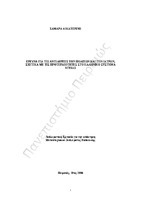Έρευνα για τις αντιλήψεις των πολιτών και των ιατρών, σχετικά με τις προτεραιότητες στο ελληνικό σύστημα υγείας
Research about the preferences of the members of the public and health professionals for setting priorities of Greek health system

Προβολή/
Θεματική επικεφαλίδα
National health services -- Greece ; Health care rationing -- Greece ; Medical policy -- Greece ; Health planning -- Greece ; Health policy -- Greece ; Εθνικό Σύστημα Υγείας (Ελλάδα) ; Εθνικά συστήματα υγείας -- Ελλάδα ; Πολιτική υγείας -- Ελλάδα ; Πολιτική υγείας -- Οικονομικές απόψειςΠερίληψη
Σκοπός της παρούσας έρευνας είναι να συγκριθούν οι προτεραιότητες των πολιτών-χρηστών υπηρεσιών υγείας και των ιατρών, καθώς επίσης και οι απόψεις τους σχετικά με τη συμμετοχή των δύο ομάδων στη λήψη αποφάσεων κατά τη κατανομή κονδυλίων σε διαφορετικά προγράμματα πρόληψης, χειρουργικές επεμβάσεις ή προγράμματα φροντίδας υγείας που απευθύνονται σε διαφορετικές πληθυσμιακές ομάδες. Το μεθοδολογικό εργαλείο, που χρησιμοποιήθηκε είναι ένα ανώνυμο ερωτηματολόγιο το οποίο απευθύνθηκε σε ένα δείγμα 300 χρηστών υπηρεσιών υγείας, και 100 ιατρών. Η διανομή των ερωτηματολογίων πραγματοποιήθηκε κυρίως με προσωπική επαφή, με mall ή με fax. Η ανταπόκριση του δείγματος άγγιξε το 100%, δηλαδή δεν επιστράφηκε κανένα αναπάντητο ερωτηματολόγιο. Για τη στατιστική ανάλυση των δεδομένων χρησιμοποιήθηκε το στατιστικό πρόγραμμα SPSS (Statistical Package for the Social Sciences). Υπολογίστηκαν βασικά στατιστικά στοιχεία και κατανομές, για το σύνολο των μεταβλητών. Για τον έλεγχο της στατιστικής σημαντικότητας των διαφοροποιήσεων μεταξύ της ομάδας των χρηστών υπηρεσιών υγείας και των ιατρών, χρησιμοποιήθηκε η t-test ανάλυση.
Σύμφωνα με τα αποτελέσματα της έρευνας, τόσο οι χρήστες υπηρεσιών υγείας όσο και οι ιατροί, θέτουν τις χειρουργικές επεμβάσεις υψηλής τεχνολογίας (καρδιοχειρουργικές επεμβάσεις, μεταμοσχεύσεις), τις υπηρεσίες αγωγής και προαγωγής υγείας, καθώς και τις θεραπευτικές αγωγές σε παιδιά με ασθένειες, ως τις τρεις βασικές προτεραιότητες για χρηματοδότηση. Η πλειοψηφία των πολιτών και των ιατρών δηλώνει ότι θα πρέπει να συμμετέχουν στη λήψη αποφάσεων κατά την κατανομή κονδυλίων σε διαφορετικά προγράμματα πρόληψης, χειρουργικές επεμβάσεις ή προγράμματα φροντίδας υγείας που απευθύνονται σε διαφορετικές πληθυσμιακές ομάδες. Στις ερωτήσεις που οι συμμετέχοντες, καλούνται να προσδιορίσουν ποιες ομάδες θα πρέπει να συμμετέχουν στη λήψη αποφάσεων κατά την κατανομή των οικονομικών πόρων, στα προαναφερθέντα προγράμματα, γίνεται εμφανής η προτίμηση των πολιτών και των ιατρών, προς την ομάδα των ιατρών, και των ασθενών με τις οικογένειές τους, τοποθετώντας στην τελευταία θέση της ιεράρχησης τους πολιτικούς. Τέλος στον τρόπο που θα κατένειμαν, τόσο οι πολίτες όσο και ιατροί ένα ποσό 10.000.000€ μεταξύ διαφορετικών προγραμμάτων πρόληψης, παρατηρείται διαφοροποίηση απόψεων: Οι χρήστες υπηρεσιών υγείας θέτουν ως βασική προτεραιότητα για χρηματοδότηση, ένα πρόγραμμα εκπαίδευσης και βοήθειας των μαθητών για την αποφυγή ή το κόψιμο του καπνίσματος, ενώ οι ιατροί ένα πρόγραμμα εκπαίδευσης γονέων με παιδιά που έχουν προβλήματα συμπεριφοράς. Όσον αφορά την κατανομή 10.000.000€ μεταξύ τριών χειρουργικών επεμβάσεων, και οι δύο ομάδες θέτουν ως βασική προτεραιότητα τη χειρουργική επέμβαση καρδιάς (bypass). Ταύτιση απόψεων παρατηρείται και στην κατανομή των 10.000.000€ μεταξύ τριών προγραμμάτων φροντίδας υγείας που απευθύνονται σε διαφορετικές πληθυσμιακές ομάδες, όπου τόσο οι πολίτες όσο και οι ιατροί θέτουν ως προτεραιότητα τα Προγράμματα που απευθύνονται σε οικονομικά ανίσχυρους, σε παιδιά και σε άτομα με χαμηλό προσδόκιμο ζωής (χαμηλό επίπεδο υγείας).
Τίτλος Προγράμματος Μεταπτυχιακών Σπουδών
Οικονομικά και Διοίκηση της ΥγείαςΤμήμα
Σχολή Οικονομικών, Επιχειρηματικών και Διεθνών Σπουδών. Τμήμα Οικονομικής ΕπιστήμηςΣυνεργαζόμενο Ίδρυμα
Ανώτατο Εκπαιδευτικό Ίδρυμα Πειραιά Τεχνολογικού ΤομέαΑριθμός σελίδων
128Γλώσσα
ΕλληνικάΣυλλογή
Εκτός από όπου διευκρινίζεται διαφορετικά, το τεκμήριο διανέμεται με την ακόλουθη άδεια:
Attribution-NonCommercial-NoDerivatives 4.0 Διεθνές
Attribution-NonCommercial-NoDerivatives 4.0 Διεθνές
Σχετικές εγγραφές
Προβολή εγγραφών σχετικών με τίτλο, συγγραφέα, δημιουργό και θέμα.
-
Ποιότητα υπηρεσιών υγείας: μέτρηση ικανοποίησης ασθενών από Δημόσιο Κέντρο Υγείας και αναδιοργάνωση του Κέντρου Υγείας βάσει των αποτελεσμάτων
Γαλανάκη, Ευφημία Α. (Πανεπιστήμιο Πειραιώς, 2000-06)Η παρούσα εργασία πραγματοποιήθηκε στα πλαίσια του Ευρωπαϊκού Μεταπτυχιακού Προγράμματος στη Διοίκηση Ολικής Ποιότητας του Πανεπιστημίου Πειραιά. Σκοπός της είναι η έρευνα ικανοποίησης των ασθενών από τις Υπηρεσίες Υγείας ... -
Ανθρώπινοι πόροι στον τομέα της υγείας
Γεωργακά, Γεωργία (Πανεπιστήμιο Πειραιώς, 2009)Σύμφωνα με τον ΠΟΥ, το ανθρώπινο δυναμικό είναι ο πιο σημαντικός συντελεστής ενός συστήματος υγείας. Η εργασία αυτή αποτελεί μια επισκόπηση της προσφοράς της ανάπτυξης, καθώς και της παρούσας κατάστασης των επαγγελματιών ... -
Η αναγκαιότητα εισαγωγής και η διείσδυση των πληροφοριακών συστημάτων στους χώρους υγείας, απαραίτητη προϋπόθεση για τη διασφάλιση και προαγωγή της ποιότητας των υπηρεσιών υγείας
Ρογκάκου, Αδαμαντία (Πανεπιστήμιο Πειραιώς, 2009-06)Είναι κοινή πεποίθηση ότι το επίπεδο ανάπτυξης των συστημάτων πληροφορικής που χρησιμοποιούνται σε ένα νοσοκομειακό ίδρυμα, δεν αποτελεί απλώς μία τεχνολογική πολυτέλεια ή μία απλή διευκόλυνση, αλλά συνδέεται άμεσα με το ...


